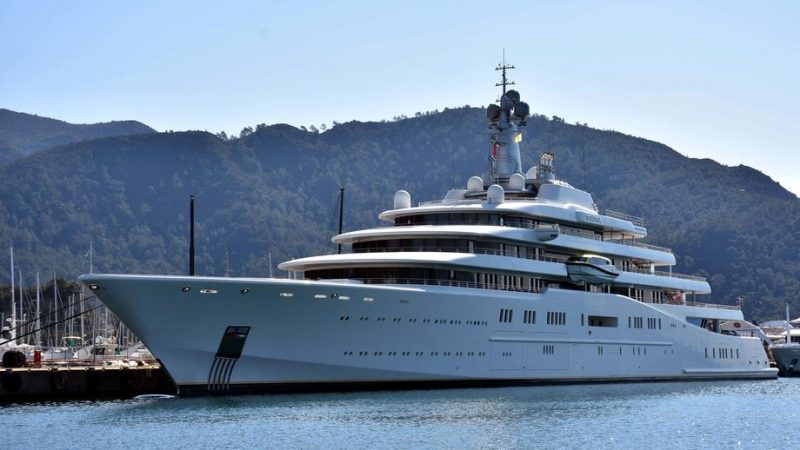« In a visit to Ankara Wednesday, US Treasury Deputy Secretary Wally Adeyemo plans to remind Turkey that anyone evading US sanctions against Russia will be held accountable » says Amberin Zaman in Al-Monitor.
US Deputy Secretary of the Treasury Wally Adeyemo was scheduled to arrive in Ankara today where he is to meet with Turkish Central Bank governor Sahab Kavcioglu and Treasury and Finance Minister Nureddin Nebati. Adeyemo is expected to raise the Biden administration’s concerns over the flow of Russian funds and assets to Turkey, two officials familiar with Adeyemo’s agenda confirmed to Al-Monitor. They did not elaborate.
Adeyemo’s visit follows meetings with top officials in the United Arab Emirates, which has also become a big magnet for Russian oligarchs seeking to evade sanctions imposed in the wake of Russia’s invasion of Ukraine.
Adeyemo, who led a departmental review of sanctions policy last year, previously warned Turkish and Emirati financial institutions of the potential consequences of helping Russia get around the restrictions, Bloomberg reported.
Turkey’s relations with Russia, notably its acquisition of Russian S-400 missiles, play a big role in its increasingly fraught relations with the United States. Turkey’s efforts to mediate between Russia and Ukraine, while supplying armed drones to Ukraine and blocking the passage of Russian naval ships through the Bosporus, created hopes for a reset between Ankara and Washington in the early days of the conflict. But these proved premature as Turkey is now threatening to veto Sweden’s and Finland’s accession to NATO, a strategic priority for the alliance and the Biden administration in particular, over their alleged support for Kurdish “terror” groups.
Turkey’s ongoing talks with Russia to establish a sea corridor in the Black Sea to export grain from Ukraine are also being viewed with suspicion in some Western capitals over concerns that the corridor can become a conduit for Russia to circumvent sanctions.
Turkey’s Defense Ministry said today that a Turkish dry cargo vessel had safely left the Russian-occupied Ukrainian port of Mariupol as a result of the talks. It was the first such vessel to set sail from Mariupol since Russia launched its invasion on Feb. 24. Ukraine is one of the world’s top suppliers of wheat, and the hiatus in shipments has sparked fears of a global food crisis.
The Defense Ministry noted that an understanding had emerged for talks to be held between Turkey, Russia, Ukraine and the United Nations to resolve the problem. It’s unclear how Kyiv has responded to the initiative and whether it approved today’s shipment of wheat that it accuses Russia of “stealing.”
Dmytro Kuleba, Ukraine’s foreign minister and a prolific tweeter, had not commented as of time of publication of this article.
As Turkey grapples with its worst economic downturn in two decades, Russian funds are being welcomed, with a record leap in sales of real estate to Russian nationals. Foreigners who purchase real estate valued at $400,000 and above are granted Turkish citizenship under a revamped golden passport rule that is drawing a growing number of Russians.
Though Turkish officials say they respect international law, they insist they are not bound by US, British or EU sanctions, and they will not target individuals based on their nationality. Images of mega-yachts belonging to Russian oligarchs such as Roman Abramovich and Alexander Nesis moored at Turkish ports have been splashed across the global media even as others were being seized across Europe.
Turkish banks are said to be acting with greater caution, with many reportedly turning high-net-worth Russian customers away.
Under Turkish law, foreigners need to open a local currency account before opening a foreign-currency-denominated one, an exercise that is supposed to help prop up the sagging Turkish lira. Russia’s MIR system for electronic fund transfers proscribed in the EU, Britain and the United States is accepted by Turkish state lenders Vakifbank and Ziraat as well as by Isbank.
Some Russian companies are also believed to be moving their operations to Turkey but registering as Turkish entities to get around sanctions. All of this will likely be raised by Adeyemo.
Turkey’s sanctions-busting activities have long been a source of friction between Ankara and Washington. Turkish state lender Halkbank is facing prosecution in a US federal court for helping Iran skirt US sanctions in what has been described as among the biggest sanctions-busting schemes in recent history. Prosecutors say Halkbank converted Iranian oil revenue into gold and then cash to benefit Iranian interests and helped Iran secretly transfer $20 billion in restricted funds through a maze of front companies. Of that amount, $1 billion was allegedly laundered in the United States. Halkbank denies the charges and says it is immune to prosecution in the United States because it is a state bank. However, a US court has rejected that argument, saying the case should proceed. Should the bank be convicted as charged, Turkey could face a multibillion dollar fine from the Treasury. Turkey is pressing for the case to be dismissed.
Al-Monitor, June 22, 2022, Amberin Zaman, Photo/Sabri Kesen

